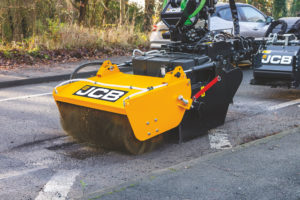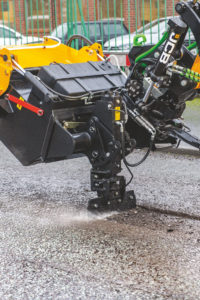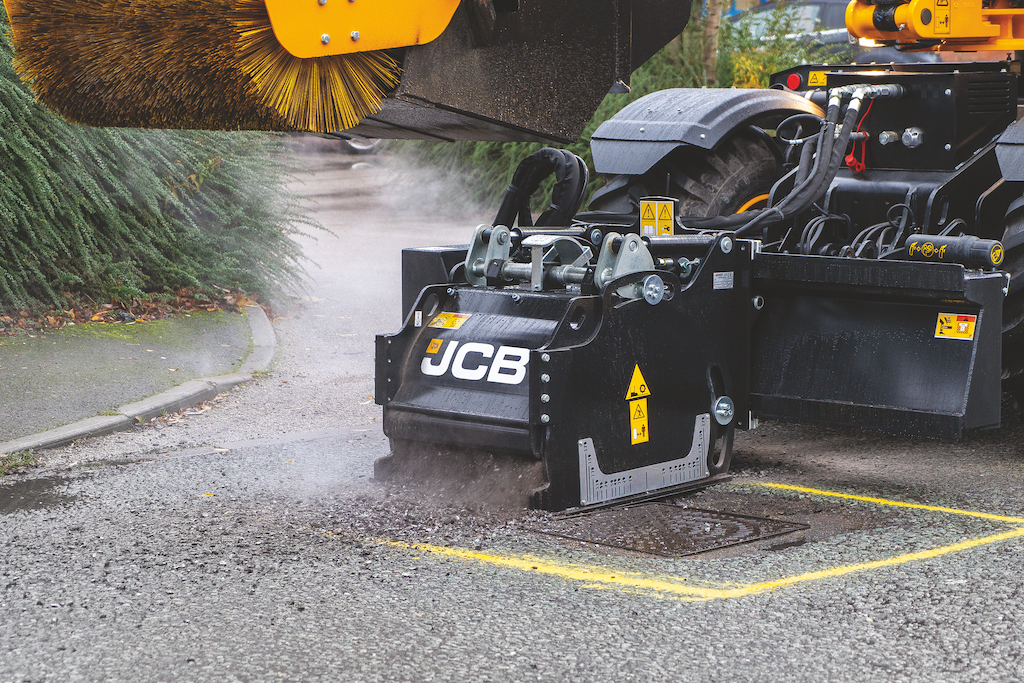A new solution from JCB could be the ace in the hole for the road repair sector.
The government has made some significant commitments in infrastructure spending in recent times – not least HS2 – but that doesn’t mean it is neglecting the maintenance of what already exists, and as far as our road network is concerned the need is indeed pressing.
Any regular traveler on or highways and byways will testify that potholes are the bane of the modern motorist, with a staggering £8.1 million paid out by local authorities just last year in compensation to drivers for vehicle damage. Indeed, the statistics are an eloquent demonstration of the scale of the problem, with councils receiving a request to fix a pothole every 46 seconds, and figures from the AA revealing that as much as £11bn needs to be spent on the problem.

In addition, with more and more commuters taking to two wheels rather than four, and the threat of very real injury to cyclists from a close encounter with an unsuspecting pot hole, the issue has even more serious implications. In an effort to address the question, the Chancellor Rishi Sunak announced last November that his administration would be investing £1.6bn to fix potholes in Britain and ‘level-up’ uneven roads, which makes the latest solution to emerge from the JCB drawing board all the more timely.
Described as a rapid, permanent repair solution, PotholePro utilises just one machine and should eliminate the need for labour intensive and physically punishing repair methods. Indeed, if it’s speed you’re after then the Staffordshire-based international plant giant’s answer can complete the job in less than eight minutes, four times quicker than standard methods – and at half the cost.
“Potholes really are the scourge of our nation,” declares JCB Chairman, Lord Bamford, who has personally led the machine’s development. “Our country is quite rightly fixated on this dreadful problem and, as a British manufacturer, I am fixated on finding a solution. We simply cannot allow our road network to continue to be blighted by potholes. JCB’s solution is simple and cost effective and fixes potholes permanently, first time. Once the machine has done its job all the contractor then needs to do is just add tar.”
It is through testing with contractors and local authorities that the manufacturer can be confident that its PotholePro can complete a repair in less than eight minutes, and that is equivalent to 700 potholes per month. Moreover, with a 40km/h travel speed, the machine can rapidly relocate between sites without additional transport costs.

So just how does it work? The unit is equipped with a modified Simex planer, with integrated dust suppression, mounted on the machine’s rear skid steer hitch. The planer is 600mm wide, with up to 1.3m of side-shift adjustment. This allows the operator to plane a full carriageway from the kerb, without repositioning the machine. Hydraulic tilt and depth control provide a consistent depth for larger patches.
A TAB two-piece boom is fitted with the JCB ‘Multi-tool’, mounted on an X12 Steelwrist tilt-rotator. The ‘Multi-tool’ comprises of two attachments, a dedicated hydraulic cropper and a sweeper/bucket. The 600mm cropping tool eliminates the need for floor saws or hydraulic breakers, providing a squared off, clean cut to the repair area. The operator then rotates the boom head to bring a 1.2m wide sweeper/bucket into use, to clean up the pothole area, eliminating the requirement for a separate sweeper truck. Material lifted by the sweeper/bucket can be loaded directly into a support truck for rapid removal from site
The PotholePro can prepare up to 250m2 of roadway in a single shift, or 5,000m3 per month, and allows the contractor or local authority to cut the defect, crop the edges and clean the hole with one machine – mechanising jobs traditionally done by pothole gangs and delivering up to a 50 per cent cut in daily costs. Safety is also improved as the gang does not have to complete the hand-held cutting and breaking, eliminating the risk of hand arm vibration syndrome (HAVS).
The machine has been in trials on roads in Stoke-on-Trent for months and the city council has worked with JCB over the last 12 months as innovation partners to develop the PotholePro. In initial testing, the machine completed 51 road repair jobs in 20 days, which would have taken a team of up to six operatives 63 days to complete normally.
Councillor Daniel Jellyman, Stoke-on-Trent City Council cabinet member for infrastructure, regeneration and heritage, said he had seen a 700 per cent increase in productivity: “Potholes are a nuisance to motorists up and down the country and we’ve worked closely with JCB to come up with a solution to what is a national problem. In a time when every penny and pound counts for local authorities, we’re delighted to be at the forefront of developing and trialling new technologies and ways of working, especially ones which could save residents money.”
“The toll of pothole damage on cars is already breathtaking,” concludes AA President Edmund King OBE. “However, as more people take up cycling due to avoiding public transport in the pandemic and if e-scooters are legalised, then sorting our poor road surfaces becomes more important than ever. JCB has taken the initiative to fix these problems, and we’re excited to see its new PotholePro take to the streets.”










